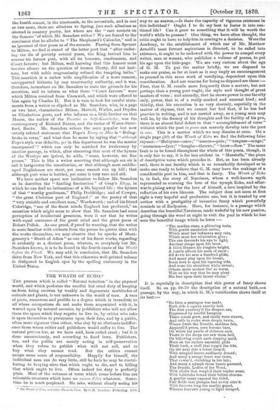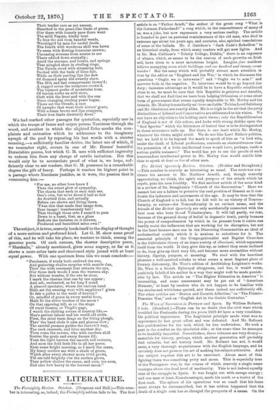THE WRATH OF ECHO.
"THE process which is called "Natural Selection" in the physical world, and which performs the needful but cruel duty of keeping as from being overrun by weakly and degenerate multitudes of animals and plants, is not unknown in the world of men. A race -of poets, numerous and prolific to a degree which is incredible to -all whose occupations do not make them acquainted with it, is warred upon by natural enemies, by publishers who will not allow them the space which they require to live in, by critics who take it upon themselves to pronounce upon their fate, and by a public, often more rigorous than either, who slay by an obstinate indiffer- ence those whom critics and publishers would suffer to live. The natural process has, as we have said, been called cruel ; but it is -done unconsciously, and according to fixed laws. Publishers, too, and the public are merely acting in self-preservation when they refuse to publish what will not sell, and to buy what they cannot read. But the critics cannot 'escape some sense of responsibility. Happily for himself, the individual man can do very little, still he feels he may be contri- buting to keeping alive that which ought to die, and to killing that which ought to live. Often indeed his duty is perfectly plain. Most of the volumes of verse which come before him are miserable creatures which have no raison d'être whatever. Some- time he is much perplexed. He asks, without clearly seeing his • The Wrath of Echo, and other Pieces in Terse. By G. 3L London: Pickering. 1870.
way to an answer,—Is there the capacity of vigorous existence in this individual ? Ought I to do my beat to foster it into con- tinued life? Can it grow to something that it will be worth the world's while to possess? One thing, we have often thought, the critic ought to have to help him in coming to a decision. Were the Academy, to the establishment of which one of Mr. Matthew Arnold's most fervent aspirations is directed, to be called into existence, it ought to be endowed with the power to compel every writer, man or woman, who publishes a volume of poems, to put his age upon the title-page. We are very carious about the age of G. M. To put the matter briefly, we are disposed to make our praise, so far at least as it may imply an encouragement to proceed in this same work of versifying, dependent upon this consideration. And our reasons for being so disposed are these:— First, that G. M. recalls more frequently than a mature, but not perhaps than a young poet ought, the style and thought of great masters of verse ; and secondly, that he shows power in one fac silty
only, power, that is, of a really marked and unusual kind; and thirdly, that his execution is so very slovenly, especially in the matter of rhymes, that we cannot but feel that, if he has had practice in writing, and is not carried away, as a young man may well be, by the fluency of his thoughts and the facility of his pen, there is an almost fatal defect in that "accomplishment of verse" without which the poet in posse can scarcely develop into the poet in ease. This is a matter which we may dismiss at once. On a single page (30) of the Wrath of Echo we find the following false rhymes : - "Halcyons —once ;" "unseen—pain ;" "tongues—songs ;" "anemones—dyes;" "boughs—throws;" "brow—flow." The same fault is to be found throughout the whole of this poem, though, it is only fair to say, it is far less evident in "Marshal's," the piece of descriptive verse which precedes it. But, as has been already said, there is one faculty which is so remarkably developed as to make one ready to believe that G. M. may have the makings of a considerable poet in him, and that is fancy. The Wrath of Echo is, in fact, the story of Narcissus, whom a well-known myth represented as scorning the love of the nymph Echo, and after- wards pining away for the love of himself, a love inspired by the reflection of his own likeness. The subject does not seem at first sight a very hopeful and productive one, but it is treated by our author with a prodigality of inventive fancy which powerfully reminds us of Endymion. Here, for instance, is a passage which describes the beautiful Narcissus, made wakeful by his new passion, going through the wood at night to visit the pool in which he has
seen the beautiful image which he loves :—
" The maiden stars, a glittering train, With gentle emulation strive, Which most her influence may rain, Which most her admiration give ; The one descends his eye to light, Another sleeps upon his brow, A third illumes his ringlets bright, A fourth affects his neck of snow ; AU down his arm a hundred glide, And many play upon his breast, Some love to span his tapering aide, And some his shoulders white invest; Others, more modest tho' as warm, Wait on his way that he may plant His feet upon their lucent charm."
It is especially in description that this power of fancy shows itself. So on pp. 63-70 the description of a natural bath,—a passage, by the way, in which G. M.'s versification shows itself at its beat :—
"Its form a pentagon was made, Each side a square exactly laid. The first pourtray'd the deepest sea, Expressed by careful Imagery. There corals grew, and shells were strewn, And cells in rocks were deeply hewn, Where dwelt the Nereids, maidens fair, Apparelrd green, save bosoms bare, On which lay pearls of richness rare. There in the deeps one saw them laid, On billowing couch each sleeping maid, Here on the surface smoothly glide Their bark, a shell that topp'd the tide. On the next side a forest loom'd, With mingled leaves sublimely domed ; And many a savage beast was there, That cower'd, shrinking in his lair; And many a nymph those beasts pursued, The Dryads, Ladies of the Wood, With shafts that weigh'd their tender arms, With baldricks bound their belted charms. A gentler scene exposed the third, Fair fields that ploughs had newly stired. With furrows long the marble gaped, Whence harvests young to light escaped,
Their tender ears as yet unseen, Sheathed in the grass-like blade of green. O'er these with homely pace there went The mild NaFees, kindly bent To free the soil from baneful weeds, Worshipp'd by man for useful deeds. The fourth with wondrous skill was hewn To seem with flowing fountains strewn ; Unceasing streams from source to sea There eddied down eternally ; Amid the streams, and founts, and springs That mingled close in circling rings, The Naiads stood with streaming hair, Decked with the buds of lilies fair, While on their parting lips the dew Of diamond spray did sweetly show. The fifth and last compartment frown'd ; A rugged scene the sculpture crown'd, The topmost peaks of mountains hoar, Of barren rocks an arid store, Cleft with the frost and with the sun Since changing circling years began. There sat the Oreads, a race Of nymphs that want their sisters' grace, With solemn brows and lips coraprest, Their iron limbs discreetly drest."
We had marked other passages for quotation, especially one in -which the troops of fauns and satyrs pursue Narcissus through the -wood, and another in which the slighted Echo mocks the coin- ?plaints and entreaties which he addressses to the imaginary nymph of the pool by repeating his last words with a sinister rneaning,—a sufficiently familiar device, the latest use of which, if we remember right, occurs in one of Mr. Barnes' beautiful Dorsetshire poems, but which G. M. uses with sufficient ingenuity to redeem him from any charge of servile imitation. But this would only be to accumulate proof of what is, we hope, suf- ficiently clear to our readers, that G. M. possesses in a remarkable degree the gift of fancy. Perhaps it reaches its highest point in
passage where Narcissus justifies, as it were, the passion that is oonsuming him :—
"For me, no other love know I Than the sweet glow of sympathy, The charm that each in each doth see, One's own, but ne'er deem'd half so fair As doubled thus, and actually Before one shown and living there. 'Twas this that made that image dear, Dear image! treacherously fair ! That through those orbs I seem'd to pass
Down to a heart, that, as a glass Reflects the features on it thrown, Produced and beautified mine own !"
The subject, it is true, scarcely lends itself to the display of thought of a more serious and profound kind. Let G. M. show some proof of this, and he will take his place, we venture to think, among the genuine poets. Of such success, the shorter descriptive poem, -"Marshals," already mentioned, gives some augury, so far as it shows a more sober taste and chastened style joined with at least oqual power. With one specimen from this we must conclude :— "Perchance, if study hath outlived the sun, And gathering shades surprise with mantle dun, Thro' the wide casement that attracts the eye, O'er those dark woods I scan the western sky. Not without wonder, if the eve be clear, I mark the charms that one by one appear ; And ask, enchanted, as for long I stand A pleased spectator, whose the curious hand Hath set the evening west with sapphires ? given So fair a pallor to the vault of heaven ? Or, mindful of grace in every useful boon, Hath lit the silver torches of the moon ? On that opposing hill, as on the stage Of rural theatre, or Virgil's page, I watch the shifting scenes of country life,— Man's patient labour and his world-old strife. First, the stout team drags on the biting plough, Thro' the hard clods it cuts and pierces slow ; The careful yeoman guides the farrow'd way, The rook succeeds, and lives another day. Then come the sowers, who with careless skill Scatter the grain and every fissure fill; Then the light harrow the smooth soil restores, And soon the field feels life in all her pores. Next some bright morning, as I mark the scene, My fancy soothes me with a shade of green, Which after every shower more vivid grows, Till em'rald brightly o'er the surface glows, Then yellow clothes the scene, and soon, too soon, Red ears bow heavy to the harvest moon."































 Previous page
Previous page